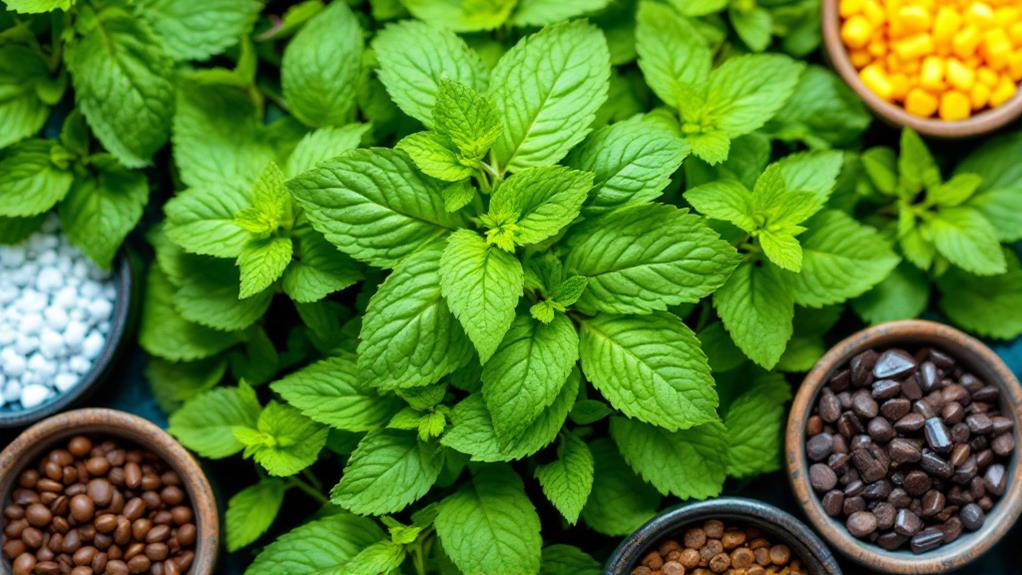Types and Health Benefits of Mint: More Than Just a Refreshing Herb

Mint isn't just a revitalizing herb; it offers numerous health benefits. Varieties like peppermint, spearmint, and wild mint enhance your culinary creations and elevate your well-being. Mint supports digestion, relieves bloating, and eases IBS symptoms. It's packed with antioxidants like rosmarinic acid, which strengthen your immune system and reduce inflammation. Regularly enjoying mint can considerably improve oral hygiene and freshen breath. Respiratory relief is another advantage, thanks to its natural decongestant properties. While incorporating mint into your life, be mindful of its potential interactions and maintain moderation. As you investigate further, you'll uncover even more of mint's remarkable qualities.
What Is Mint?
Mint, a versatile and aromatic herb, belongs to the genus Mentha and includes species like peppermint and spearmint, which you might recognize from your kitchen or medicine cabinet. This cool-flavored herb is more than just a culinary delight; it offers a range of health benefits that you can incorporate into your daily routine. As a member of the genus Mentha, mint is renowned for its invigorating aroma and flavor, making it a popular choice in foods, beverages, and even dental products.
You might be surprised to learn that mint's vital oils are a powerhouse for digestive health. Peppermint, in particular, is famous for its ability to soothe digestive issues. When you consume mint in forms like fresh leaves, dried, or as tea, you're tapping into its potential to alleviate symptoms like indigestion and bloating. The vital oils found in mint stimulate the digestive enzymes, ensuring smoother digestion.
Beyond its digestive benefits, mint also thrives in wetland areas but can become invasive if left unmanaged in your garden. So, while enjoying its health benefits, it's also important to manage its growth carefully in your landscape.
Popular Varieties of Mint
While mint's health benefits are well-known, its variety offers diverse flavors and uses. You might be familiar with peppermint (Mentha × piperita), which packs a punch with its strong flavor and high menthol content. It's perfect for desserts and candies, making them revitalizing and invigorating. Spearmint (Mentha spicata), on the other hand, has a milder taste, often finding its way into culinary dishes, particularly when paired with fruits or used in beverages for a subtle hint of minty brightness.
Beyond these, the varieties of mint expand to include the delightful chocolate mint (Mentha × piperita 'Chocolate'). This variety carries a unique chocolate aroma, adding an exciting twist to drinks and desserts. Apple mint (Mentha suaveolens) offers a fruity scent, ideal for salads and beverages, infusing them with a light, sweet essence.
Wild mint (Mentha arvensis) stands out with its intense flavor and aroma, often utilized in traditional remedies. Each variety not only improves the taste of your dishes but also brings associated health benefits. Growing mint at home is straightforward, providing a sustainable and fresh flavoring source for your culinary adventures.
Nutritional Profile

When you investigate mint's nutritional profile, you'll uncover its impressive array of important nutrients packed into a low-calorie package. Fresh peppermint, for instance, contains only 4 calories per quarter cup. Despite its low-calorie count, it offers a significant nutritional breakdown. One standout in fresh mint is its high vitamin A content—providing about 15% of your Daily Value in just a small serving. This vitamin plays an important role in maintaining good eyesight and supporting your immune system, contributing to overall well-being.
In addition to vitamin A, mint is rich in vitamin C, another key nutrient that enhances immune function and promotes skin health. But that's not all—fresh mint is also a good source of minerals such as iron, calcium, and magnesium. These minerals are crucial for different bodily functions, from bone health to oxygen transport.
Another significant aspect of mint's nutritional profile is its high antioxidant content. Antioxidants like rosmarinic acid found in mint help combat oxidative stress and inflammation, protecting your cells from damage. Including fresh mint in your diet can give your body a valuable lift of these protective compounds.
Digestive Health Benefits
A multitude of digestive health benefits come with incorporating mint into your diet. This invigorating herb, especially peppermint, is well-known for its ability to support your digestive system. Here's how mint can improve your digestive health:
- Smooth Muscle Relaxant: Mint acts as a smooth muscle relaxant in the gastrointestinal tract, which can help alleviate symptoms of indigestion and gas.
- Irritable Bowel Syndrome Relief: Peppermint oil is particularly effective in reducing symptoms of Irritable Bowel Syndrome (IBS), such as abdominal pain and discomfort. Its antispasmodic properties help ease stomach cramps and promote digestive comfort.
- Digestive Aid: Drinking mint tea after meals may aid digestion by expelling gas and reducing bloating. This simple habit can make a big difference in how you feel after eating.
- Boosts Bile Production: Mint boosts bile production, which is crucial for proper fat digestion and complete gut health. By promoting bile flow, mint helps your body break down fats more efficiently, contributing to better digestive health.
Incorporating mint into your daily routine—whether through tea or supplements—can provide these substantial benefits, making it more than just an invigorating herb.
Immune System Support

Mint isn't just a flavorful improvement to your meals; it also plays a vital role in supporting the immune system. Rich in antioxidants like rosmarinic acid, mint helps combat oxidative stress, aiding overall immune function. By incorporating mint into your diet, you're giving your body a lift with its antibacterial and antiviral properties, which can help ward off different illnesses.
The presence of flavonoids in mint contributes to its anti-inflammatory effects. This is significant because reducing inflammation in the body promotes better immune responses, ensuring that your body can effectively fight off infections. Drinking mint tea, made from fresh or dried leaves, can offer a soothing effect, improving your respiratory health, especially during cold and flu seasons. This not only assists the immune system but also provides comfort when you're feeling under the weather.
Moreover, mint's invigorating aroma has calming effects, potentially reducing stress levels. Since stress can weaken your immune system, the calming nature of mint can indirectly lead to a more resilient immune system. So, by enjoying mint, you're not only adding flavor to your life but also supporting your health in different ways.
Oral Health Advantages
In the domain of oral health, mint stands out for its remarkable antibacterial properties, effectively combating the bacteria responsible for bad breath and oral infections. When you use mint-based products, you're not just freshening your breath momentarily; you're tackling the root causes of oral hygiene issues. Here's how mint can improve your dental care routine:
- Bad Breath Reduction: Regular consumption of mint can greatly reduce bad breath, making it a staple in toothpaste and mouthwash formulas.
- Plaque Prevention: Some studies suggest that mint might help prevent dental plaque formation, contributing to better oral hygiene. This means fewer visits to the dentist for plaque-related issues.
- Peppermint Oil Benefits: Derived from mint, peppermint oil boasts antibacterial and antifungal properties, making it a powerful ally in maintaining oral health. This oil can improve the effectiveness of your daily oral care.
- Routine Support: Including mint in your dental care products promotes fresh breath and supports your oral health routines, ensuring you maintain a healthy mouth with ease.
Respiratory Relief

Breathing freely is vital, and peppermint can be your ally in achieving this relief. Mint, especially the peppermint variety, is known for its menthol content, which serves as a natural decongestant. It helps clear nasal passages and improves airflow, making breathing easier when you're feeling congested. The menthol in mint doesn't just stop there; it has the ability to relax the muscles in your respiratory tract, providing significant respiratory relief.
Mint's antimicrobial properties also play a key role in combating respiratory infections. By potentially reducing the duration and severity of cold symptoms, mint can be a valuable ally when you're battling a respiratory illness. Inhaling the rejuvenating aroma of mint can soothe sore throats and reduce coughs, offering symptomatic relief that can make a big difference when you're not feeling your best.
If you're looking for comfort along with respiratory benefits, consider sipping on some mint tea. The warmth and comfort of the tea can alleviate congestion and improve general respiratory function. Welcome the power of mint to keep your airways clear, ensuring easier and more comfortable breathing when you need it most.
Culinary Uses of Mint
In regards to improving your culinary creations, few ingredients offer the versatility and revitalizing flavor of mint. This invigorating herb can transform ordinary dishes into extraordinary experiences with its unique taste. Mint's culinary applications are vast, and its refreshing flavor makes it a key ingredient in many kitchens. You can investigate creative culinary uses by incorporating mint into diverse dishes and drinks.
Here's how to make the most of mint in your kitchen:
- Salads and Sauces: Add fresh mint leaves to your salads or blend them into sauces for a revitalizing flavor that complements fruits, meats, and vegetables.
- Desserts: Incorporate mint into desserts like ice creams and sorbets. The cool, invigorating twist of peppermint can raise your sweet treats.
- Drinks: Mint is versatile in beverages such as cocktails, teas, and infused water. Its flavor and visual appeal make it a favorite in revitalizing summer drinks.
- Marinades and Smoothies: Get creative by adding mint to marinades for meats or blending it into smoothies for an added burst of freshness.
Incorporating mint into your dishes not only improves flavor but also adds a delightful visual element, making your culinary creations both tasty and appealing.
Considerations and Precautions
When incorporating mint into your diet, it's essential to be mindful of certain considerations to guarantee your safety and well-being. Initially, moderation is key. Excessive consumption of mint can lead to digestive issues, causing discomfort rather than the invigorating benefits you're seeking. Keep an eye on your intake to avoid these adverse effects.
If you have allergies, particularly to mint, be aware that you might experience adverse reactions. Monitor your body's response closely, especially if you're introducing mint for the initial time. Pregnant women should exercise caution and seek medical advice before consuming mint. Its effects during pregnancy aren't fully understood, so consulting with a healthcare provider confirms you and your baby stay safe.
Mint can also interact with certain medications, particularly anticoagulants. If you're on medication, discuss with your healthcare professional before adding mint as a supplement. This interaction could affect the efficacy of your medications, making it a significant consideration.
Lastly, keep in mind that not all mint varieties offer the same benefits. Peppermint and spearmint, for instance, have different medicinal properties. So, choose the right type for your needs, considering all these factors.




